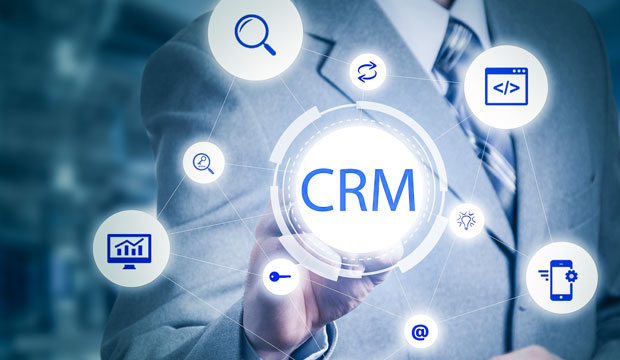Brian Signorelli is the director of HubSpot’s sales partner program.
In this exclusive interview, Signorelli discusses the benefits of transforming data into insight.

CRM Buyer: What are some current trends you see happening in the CRM space?
Brian Signorelli:
One of the first things that stands out to me is that, ironically, despite all the money that is spent on CRM overall, sales reps aren’t spending that much time there. Instead, reps are using all these tools that are connected in some way to CRM, like email or sales acceleration. As a former sales rep, I get that.
The second big trend that I see is that the sales tech ecosystem is really booming. The space has attracted billions of dollars in venture capital. The third is integration and migration, and the fourth is reporting. With so many different tools now, we’re seeing a rise in reporting platforms.
Finally, while larger businesses have widely adopted CRM, the one group that’s lagging behind is businesses with fewer than 10 employees, and they’re going to be catching up.
CRM Buyer: Is CRM important for those smaller businesses?
Signorelli:
Yes, absolutely. If you don’t have a single source of truth to understand the different interactions you’re having with customers and prospects, you’re never going to get a unified view of what’s going on. That’s going to lead to a poor buying process or customer service process.
There’s no excuse for a business not to be using some type of CRM. I think where the smallest businesses get lost with CRM is they view it as a glorified Rolodex. I didn’t really see the value of a CRM until I saw what you can do when you connect outside systems, like marketing, to CRM.
When you connect all the marketing data you have and plug that information into CRM, it transforms into something that provides actionable intelligence for creating a really cohesive and powerful buyer or customer experience.
CRM Buyer: What is the key to building deep and lasting relationships with customers?
Signorelli:
One part is about the value that you’re providing to the customers, and the second part is the trust. When I say value, I mean the customer does not have just a relationship of convenience with you. You need to show over time that you offer the best solution relative to any other products out there.
When I say trust, I mean you actually deliver on your promise and do the right thing when something doesn’t go right. This involves being really transparent, and owning it when things go wrong.
Speed is another part of that. We live in the age of convenience, an on-demand world, so when there are issues, the ability to respond to issues really quickly matters a lot.
Another area is customer service. One interesting thing is that half of all businesses that use CRM plan to increase their spending on customer service. I think we’re on the event horizon of that changing, and that’s going to pick up.
CRM Buyer: Why is it important to have deep insight into customers? How can raw data be transformed into insight?
Signorelli:
I love data. Data can really drive decision-making across the business. If you don’t understand your customers and the ways they’re interacting with you, you really won’t be able to make informed decisions about where to invest money and where to cut back. It will flow down into how I allocate a budget, who I hire, and which products I’ll invest in.
If you don’t have good data, it’s difficult to make any of those decisions, and you’re flying blind. If you’re going to strip CRM down to its most basic functionality, it serves the function of adding contacts into a single repository. If you look at that as raw data, though, the question is, how do you turn that into insight? How do you turn logging calls into insight?
It’s one thing for me to understand how many calls my salespeople are making, but if I understand who they’re calling, and what types of businesses, that’s something that’s meaningful to me in order to coach my team members.
CRM Buyer: What does it mean to nurture leads, and why is it important?
Signorelli:
The reality is that most percent of people are not ready to buy from you today. The question is, how do you engage them in a meaningful way that is not really sales-y and yet ensures you stay top of mind so when they do enter a buyer’s journey in a few months, they’ll call you?
We have to nurture them with content over time. That might include webinars, e-books, whitepapers or industry news. It’s also important to share that information back with your sales team so you understand when people are contacting people, and nurture them further down the buyer funnel.
CRM Buyer: How is CRM evolving and changing? What’s in the future?
Signorelli:
Eventually CRM is going to be ubiquitous, and it’s also going to be entirely cloud-based. I really don’t see the value in on-premises CRM anymore. If you take the whole market together, most companies who are using CRM are using cloud-based systems. The cost of delivery and management is so much better with the cloud.
The second thing we’re going to see is the integration of CRM into a rep’s workflow, as opposed to the other way around. Historically, the vision was that reps would live in CRM and do all of their work there. That’s just not how it works. As a rep, I spent hardly any time in CRM. I spent time in email, on the phone, on LinkedIn, and in meetings. I didn’t spend my time in CRM. I only logged anything in CRM because my manager told me to.
History gravitates toward simplicity. We always find that the simplest, easiest, and most convenient solution wins. In the future, CRM is going to follow reps regardless of what other software tools they use.
Even as it becomes less important to individual reps, CRM will become more important to companies overall. AI, machine learning, and deep learning are all the rage, but the only way you unlock the power in AI is by feeding it large volumes of data.
As more companies have now adopted CRM, and integration becomes better over time, and, frankly, as time goes on, the amount of data that lives in these tools is going to get really big. The question will really be, can companies harness insight and connectivity from that data?
CRM also has the potential to become a little bit self-aware. As we gather more information, it’s going to be interesting to apply AI to be able to do things like talk to the CRM system and log my calls and emails or set an appointment.
With all this data within the CRM, why can’t my CRM tell me that that’s the person to call at a specific time? Why can’t my CRM recommend the exact messaging to use with a particular person, because the CRM has all the data about that person and understands what they need? I don’t think we’re far off from that. It doesn’t mean we won’t need humans, but it means that the capabilities of humans will get augmented.
The last thing is that with the explosion of all of this technology, spending is going to be growing in the customer service space. Over time, CEOs are going to gravitate toward an integrated platform. I don’t think there’s much appetite or interest for CEOs to have many apps across the enterprise. Instead of building franken-solutions, we’re going to see more integrated, platform-oriented solutions.



























































Social CRM
See all Social CRM